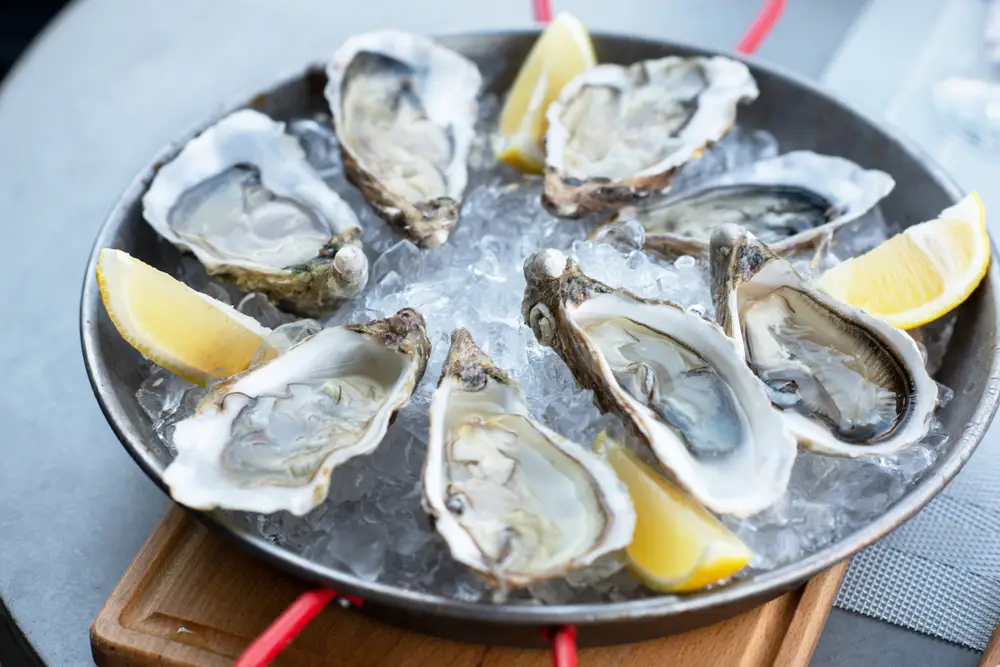Disclosure: Thank you for reading our articles! Some links may be affiliate links. We may get paid if you buy something or take an action after clicking one of these links. Additionally, as an Amazon Associate, I earn from qualifying purchases.
Oysters are a delicious delicacy, and are surprisingly good for you. They are fairly healthy food to consume, and are not too high in carbohydrates. For every 100 grams of oysters, there is only around 12 grams of carbohydrates, which is a very low amount.
If you are someone that is on a low carb diet, for specific health reasons, or out of choice, you can consume oysters with no issues. As they are so low in carbohydrates, they are suitable for someone that is on a Keto diet too.
While oysters may be low in carbohydrates, they certainly make up for this in terms of the nutrients that they have.
Oysters are a great seafood to consume as they contain omega03, and omega-6 fatty acids. These are great for your body, and are healthy fatty acids to consume that will benefit you.
In addition to this, they contain other types of nutrients, such as calcium, sodium, zinc, potassium, and vitamin B12, all of which will help to nourish your body.
While you can choose to eat oysters alone, they are fantastic when added to various savory dishes, and are a great healthy, seafood alternative.

Why are there carbs in oysters?
You may be surprised to learn that oysters contain carbohydrates. When it comes to the vast majority of meat, fish, and shellfish, as they are a protein source, they do not contain carbs.
However, a small handful of shellfish do contain carbs. There is typically not enough for it to have a significant effect.
When looking at oysters in particular, for every 100 grams, they only contain 12 grams of carbs, which is a very low amount. Though, this is still significantly more than the average protein.
Oysters have glycogen in their muscles, and this is what causes them to contain carbs. This is because when the oysters die, the sugar that is stored as glycogen in their muscles is not expelled.
While the sugars are typically expelled in other animals upon death, this is not the case with oysters.
As a result, this sugar remains in the muscles, which causes there to still be carbs present. Taking into consideration how small oysters are in comparison to other types of protein, this is why only a small amount of carbs remains.
The same process happens with other types of shellfish. However, this does not mean that oysters are unhealthy. The amount of carbs is so small that even people who choose to eat a low carb diet, can still consume oysters with no issues.
Overall, they are a very healthy type of protein, and contain a lot of useful nutrients. They are high in nutrients such as fatty acids, vitamin B12, and zinc.
How many carb geisha smoked oysters?
As we have already discussed, oysters do contain a small amount of carbohydrates. However, this is such a small amount that it does not affect your experience of eating this shellfish.
When looking at Geisha smoked oysters, they actually only contain around 6 grams of carbs for every 0.3 cup, which is around 50 grams.
When you smoke oysters, the amount of carbs that are present in the oysters does not really change, and raw oysters will contain a similar amount per 50 grams.
However, you should not allow this to put you off eating oysters. As this is such a small amount, even if you are eating a low carb diet, oysters can still be consumed with no issues.
If you are unfamiliar with Geisha Smoked Oysters, they are a type of canned oyster. Geisha is a popular brand when it comes to canned oysters, and they offer a number of different options.
The smoked oysters are canned in sunflower oil, and are fairly inexpensive to purchase. Even though they are canned food, they are still a healthy option to eat and are full of many great nutrients that will benefit you, such as zinc, and selenium.
How many carbs are in raw oysters?
The amount of carbs in raw oysters is very similar to oysters that have been smoked or cooked. Typically, for every ounce, there is around 1.1 grams of carbs. This is the equivalent of 28.35 grams.
As you can see, while the carbs are present, this is such a low amount that it is negligible. Oysters are a healthy option being high in protein and low in fat. Given this, the amount of carbs that are present is insignificant, and occurs naturally.
Many people choose to eat raw oysters as this is considered a delicacy, however, if you are eating raw oysters, care should always be taken. If they have not been handled correctly, the raw oysters can contain vibriosis which is a bacterium that can cause illness such as vomiting and diarrhea.
This is why it is important to always ensure that you are eating oysters from a responsible source where the oysters live, not contaminated, and have been handled correctly.
How many carbs are in steamed oysters?
On average, steamed oysters contain around 5.4 grams of carbohydrates, which is slightly less than raw and other cooked oysters. This is likely due to the way in which they are cooked.
While they do contain negligible amounts of carbs in them, oysters are a great protein to eat. They are filled with a lot of nutrients, and they are a healthy option overall.
Although the majority of people do choose to eat oysters raw, they can absolutely be eaten once steamed too. In the majority of cases, this is actually safer to do so as it will kill any lingering bacteria that the oysters contain when they are raw.
As with the other types of oyster, because there is such a small amount of carbs in steamed oysters they are still okay to eat if you are on a low carb or a keto diet, and the amount of carbs is not enough to affect this.

